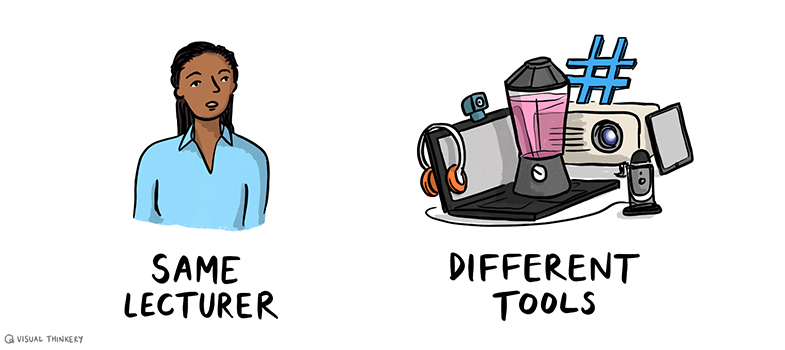1.3 Foster a sense of community
Learning online is not an individual process – there are many ways of bringing learners together in order to support their studies. Wenger’s (1998) concept of ‘communities of practice’ has become popular in education over the past two decades. Wenger suggests that people who share a common goal or purpose can form a community of practice through which they share insights and experiences. Members of one of these communities are practitioners in a particular area. For example, they might be learning technologists who discuss their ideas and experiences in a shared online space. Participating in a community of practice is a social activity that provides opportunities for learning and strengthens the connections between members.
Building a sense of community is important for online learning, as learners can readily drift away or feel isolated due to the nature of online engagement. It is therefore important that you take steps to keep students together and engaged. This might involve reminding them of what they are supposed to be working on at any given time. Drawing on the concept of communities of practice, the university can emphasise that connecting and sharing with like-minded others can be very beneficial.
Educators may find that they spend less time engaging with students through lectures or traditional sessions because the material is presented in a form that students can access independently at any time. In an online environment, the role of the educator can become more supportive and collegiate, making students aware that their teacher’s primary role is to help them to succeed on the course. To this end, it can be useful for educators to construct an individual relationship with each student rather than always relying on mass or automated emails.
Activity 3.3 Benefitting from a community of practice
Now that you have reflected on your engagement (or lack of engagement) with the course community of practice, decide how you would like to engage with it from this session onwards.
Comment
Members of a community of practice often engage with the community for a variety of purposes. Sometimes their activities are purely social or purely academic, and sometimes they include a mixture of different activities. Research has shown that when the community is engaged with a balance of different activities, the members benefit the most. Therefore, try to engage with both social and academic/practice-related activities of your course community of practice.
If you have time, and this is a subject that interests you, follow this link to learn more about communities of practice [Tip: hold Ctrl and click a link to open it in a new tab. (Hide tip)] .
1.2 Know the students






